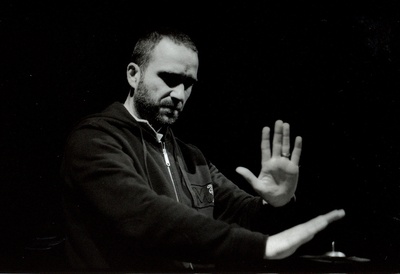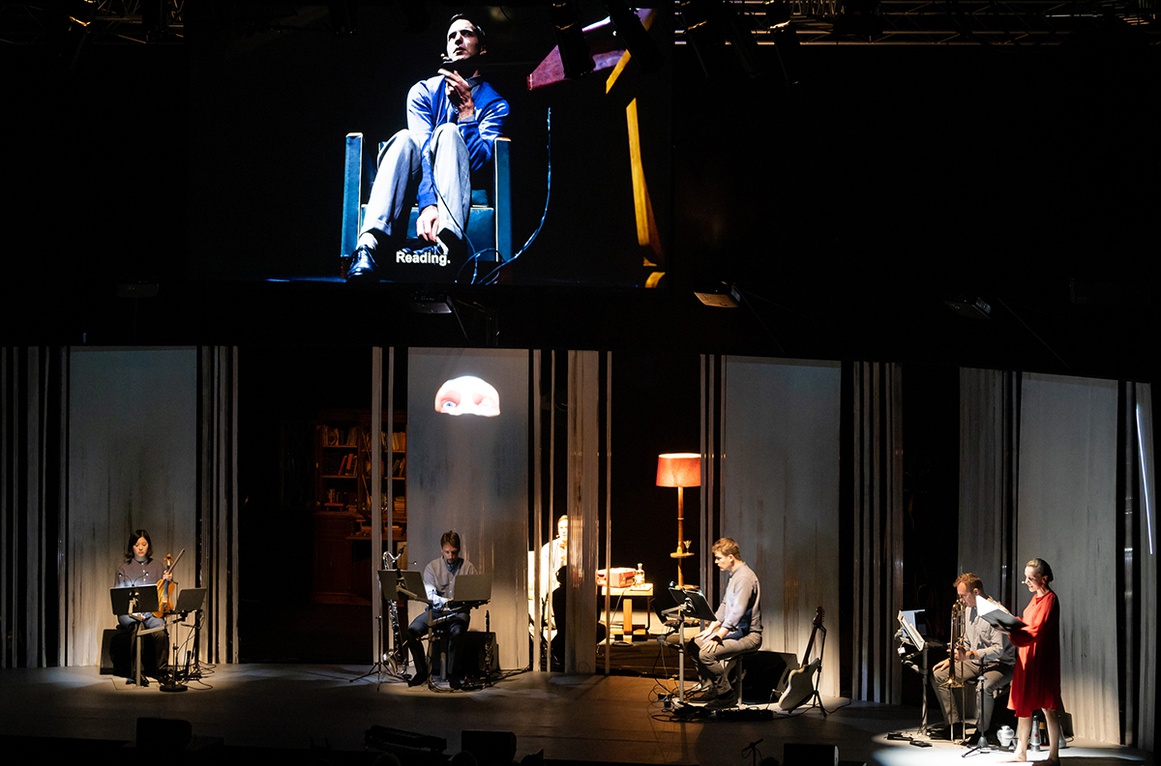Les 100 ans de Donaueschingen 2/3 : « Alan T. » de Pierre Jodlowski
Les deux autres pièces made in Ircam ont l’honneur de clôturer le festival, le dimanche 17 octobre. Ce sont deux propositions de ce que pourrait être l’opéra aujourd’hui — « opéra » étant entendu au sens d’articulation de la musique avec le texte, la scène, la voix et le lyrique. Deux propositions esthétiquement aux antipodes l’une de l’autre.
 La première nous vient de Pierre Jodlowski, qui traite là un sujet aux enjeux complexes et ramifiés : Alan Turing. Mathématicien et cryptographe de génie, héros méconnu de la deuxième guerre mondiale, père de l’informatique moderne, prophète des intelligences artificielles, martyr des persécutions homophobes… il y a, comme on le voit, beaucoup à dire sur cette personnalité emblématique du XXe siècle — et plus encore du XXIe, alors même qu’il est mort en 1954.
La première nous vient de Pierre Jodlowski, qui traite là un sujet aux enjeux complexes et ramifiés : Alan Turing. Mathématicien et cryptographe de génie, héros méconnu de la deuxième guerre mondiale, père de l’informatique moderne, prophète des intelligences artificielles, martyr des persécutions homophobes… il y a, comme on le voit, beaucoup à dire sur cette personnalité emblématique du XXe siècle — et plus encore du XXIe, alors même qu’il est mort en 1954.
La richesse du sujet est suggérée dès l’entrée du public : sur un écran au-dessus de la scène défilent aléatoirement — en caractères verts, avec curseur clignotant, comme sur les écrans d’ordinateurs des années 1990, accompagnés de grésillement électriques et de bruits d’imprimante hors d’âge — les principaux concepts, notions et anecdotes attachés à la vie d’Alan Turing (le test qui porte son nom, la castration chimique dont il a été victime suite à sa condamnation pour homosexualité, etc.).
Mais Pierre Jodlowski n’en est pas à sa première tentative de traitement d’un tel sujet. On peut même dire qu’Alan T. vient couronner des efforts engagés voilà une quinzaine d’années, avec notamment Le Royaume d’en bas, Ghostland ou San Clemente. La forme du spectacle est ici parfaitement aboutie, parvenant à jongler sans être (trop) sentencieux entre tous les niveaux d’analyse. Porté par la soprano Joanna Freszel, le comédien Thomas Hauser (qui incarne le mathématicien, quand il y a lieu) et cinq musiciens de l’Ensemble Nadar, auxquels s’ajoute un dispositif électronique et vidéo conçu avec Thomas Goepfer, Alan T. mène de front quatre ou cinq discours concomitants, dans un véritable contrepoint dramaturgique. La biographie de Turing fait bien évidemment office de fil rouge (à l’instar de sa passion pour la course de fond qui ouvre le spectacle), auquel se greffent des réflexions philosophiques, psychanalytiques, sociétales, théoriques, etc.
 Alan T. avec l'Ensemble Nadar, la soprano Joanna Freszel et Thomas Hausser (sur l'écran) © SWR/Ralf Brunner
Alan T. avec l'Ensemble Nadar, la soprano Joanna Freszel et Thomas Hausser (sur l'écran) © SWR/Ralf Brunner
Si le tragique de l’histoire est bien évidemment mis en avant (enfance difficile, castration chimique, suicide), l’humour de l’homme (que certaines représentations oublient parfois un peu vite) n’est pas absent, notamment dans les savoureuses « conversations », évidemment fictionnelles, que Turing a avec sa machine — laquelle l’interroge avec curiosité sur le monde des humains et, on le devine en filigrane, la manière dont elle pourrait passer avec succès le fameux « test de Turing » (« imitation game » en anglais, qui jauge la capacité d’une machine à se faire passer pour humaine). Le statut de héros qu’on lui a dressé a posteriori (concernant ses succès de cryptographe sur Enigma) est également remis en perspective, en mentionnant les travaux réalisés avant-guerre par des équipes polonaises et sur lesquels Turing s’est appuyé, en même temps que les bataillons de femmes calculatrices sans lesquelles l’équipe de la « Hut 8 » à Bletchley Park n’aurait sans doute pas relevé aussi brillamment le défi.
Quant à la musique, mêlant acoustique et électronique, elle souligne tous les discours avec une force expressive rare. Et si l’on aurait pu craindre une électronique par trop illustrative, même les traitements qui nimbent les voix s’avèrent délicats et finement dosés, aucunement gadget et totalement au service des diverses dramaturgies.
Toujours dans le domaine de l’électronique, les membres de l’Ensemble Nadar sont ici bien plus que de simples musiciens : outre leurs instruments, ils sont également interprètes de divers effets audio/vidéo. Grâce à des ordinateurs, ils gèrent l’aspect de ce que l’on doit bien appeler des « avatars », au sens que les réseaux sociaux ont donné à ce mot, projetés sur une toile tendue derrière eux. Convoquant tout à la fois 1984, 2001, Blade Runner, Alien et quelques autres chefs-d’œuvre d’anticipation, les traitements qu’ils infligent à leurs images suggèrent la formidable histoire des fantasmes qu’a suscités le concept même d’intelligence artificielle — au-delà de ses capacités véritables et de sa réalité.
Ce ne sont là que quelques-uns des aspects prégnants de ce spectacle riche que l’on oserait presque qualifier de divertissant, si le terme ne portait tant de charge péjorative — au reste, nombre des inspirations qui traversent la pièce montrent bien qu’un chef-d’œuvre peut très bien avoir été conçu comme un « divertissement ».
Par Jérémie Szpirglas, octobre 2021
Photo 1 : Pierre Jodlowski © Gilles Vidal



